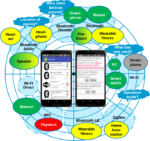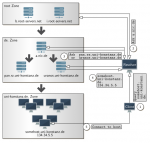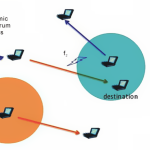General audience texts
Besides the scholarly publications listed below, I have written many texts in English and German. My more notable German texts appeared by DNIP.ch. I also maintain document collections intended for a broad audience:
Scholarly publications
Up-to-date citation counts (provided by Google Scholar). List of patents granted.
2017
Robert Müller; Marcel Waldvogel; Corinna Schmitt
MoDeNA: Enhancing User Security for Devices in Wireless Personal and Local Area Networks Proceedings Article
In: Proceedings of AIMS 2017, 2017.
Abstract | BibTeX | Tags: Internet of Things, Mobile Networks, Security, Usability | Links:
@inproceedings{Müller2017MoDeNA-AIMS,
title = {MoDeNA: Enhancing User Security for Devices in Wireless Personal and Local Area Networks},
author = {Robert Müller and Marcel Waldvogel and Corinna Schmitt},
url = {https://netfuture.ch/wp-content/uploads/2017/07/mueller2017modena.pdf
https://netfuture.ch/wp-content/uploads/2017/07/modena_presentation_aims_2017_07_12.pdf},
year = {2017},
date = {2017-07-10},
urldate = {1000-01-01},
booktitle = {Proceedings of AIMS 2017},
abstract = {Today most used devices are connected with each other building the Internet of Things (IoT). A variety of protocols are used depending on the underlying network infrastructure, application (e.g., Smart City, eHealth), and device capability. The judgment of the security feeling of the data sharing depends on personal settings (e.g., easy to use, encrypted transmission, anonymization support). MoDeNA – a Mobile Device Network Assistant – was developed offering an opportunity for understanding the judgment of security by bringing the user’s concerns and their technology understanding of used devices and protocols into relation. MoDeNA provides a transparent overview over the used wireless security of the user’s device giving concrete advices for improving the connection security and usability of mobile device security.},
keywords = {Internet of Things, Mobile Networks, Security, Usability},
pubstate = {published},
tppubtype = {inproceedings}
}

2015
Andreas Rain; Daniel Kaiser; Marcel Waldvogel
Realistic, Extensible DNS and mDNS Models for INET/OMNeT++ Proceedings Article
In: Proceedings of the “OMNeT++ Community Summit 2015â€, 2015.
Abstract | BibTeX | Tags: DNS-SD, Mobile Networks, Multicast, Service Discovery, Simulation, Zeroconf | Links:
@inproceedings{rain2015realistic,
title = {Realistic, Extensible DNS and mDNS Models for INET/OMNeT++},
author = {Andreas Rain and Daniel Kaiser and Marcel Waldvogel},
url = {https://netfuture.ch/wp-content/uploads/2016/06/rain2015realistic.pdf
https://netfuture.ch/wp-content/uploads/2016/06/rain2015realistic-slides.pdf},
year = {2015},
date = {2015-09-03},
urldate = {1000-01-01},
booktitle = {Proceedings of the “OMNeT++ Community Summit 2015â€},
abstract = {The domain name system (DNS) is one of the core services in today’s network structures. In local and ad-hoc networks DNS is often enhanced or replaced by mDNS. As of yet, no simulation models for DNS and mDNS have been developed for INET/OMNeT++. We introduce DNS and mDNS simulation models for OMNeT++, which allow researchers to easily prototype and evaluate extensions for these protocols. In addition, we present models for our own experimental extensions, namely Stateless DNS and Privacy-Enhanced mDNS, that are based on the aforementioned models. Using our models we were able to further improve the efficiency of our protocol extensions.},
keywords = {DNS-SD, Mobile Networks, Multicast, Service Discovery, Simulation, Zeroconf},
pubstate = {published},
tppubtype = {inproceedings}
}

2014
Muhammad Arshad Islam; Marcel Waldvogel
Analysis of Cognitive Radio Enabled Flooding in Opportunistic Networks Journal Article
In: International Journal of Communications, Network and System Sciences, vol. 7, pp. 212-222, 2014.
Abstract | BibTeX | Tags: Mobile Networks, Opportunistic Networks | Links:
@article{islam2014cognitive,
title = {Analysis of Cognitive Radio Enabled Flooding in Opportunistic Networks},
author = {Muhammad Arshad Islam and Marcel Waldvogel},
editor = {Scientific Research},
url = {https://netfuture.ch/wp-content/uploads/2015/06/islam2014cognitive.pdf},
doi = {http://dx.doi.org/10.4236/ijcns.2014.77023},
year = {2014},
date = {2014-07-01},
urldate = {1000-01-01},
journal = {International Journal of Communications, Network and System Sciences},
volume = {7},
pages = {212-222},
abstract = {Epidemic routing (Flooding) is considered as a simple routing protocol for opportunistic networks where the participants attempt to transmit whatever information they have to everyone who does not already have that information. However, it is plagued with disadvantages of resource scarcity as it exerts stress on available bandwidth as well as storage capacity of the devices in the network. Cognitive radio (CR) is one of the emerging technologies that can improve the bandwidth utilization by smart allocation of spectrum radio bands. Ideally speaking, a spectrum-aware cognitive radio is able to sense the local spectrum usage and adapt its own radio parameters accordingly. In this study, we have performed experiments to analyze the gains achieved by flooding protocol using cognitive radios of varying capabilities in opportunistic networks. We have performed expe- riments on three opportunistic networks obtained from real-life traces from different environments and presented results showing variance in delivery efficiency as well as cost incurred on those scenarios. Our results show that performance of flooding can be significantly improved using CRs in bandwidth-scarce environments; however, the improvement is not uniform with the increase in a number of available bands.},
keywords = {Mobile Networks, Opportunistic Networks},
pubstate = {published},
tppubtype = {article}
}

2011
Arshad Islam; Marcel Waldvogel
Questioning flooding as a routing benchmark in Opportunistic Networks Proceedings Article
In: Proceedings of the Baltic Congress on Future Internet Communications, pp. 128-133, 2011.
Abstract | BibTeX | Tags: Mobile Networks, Opportunistic Networks | Links:
@inproceedings{Islam2011Questioning,
title = {Questioning flooding as a routing benchmark in Opportunistic Networks},
author = {Arshad Islam and Marcel Waldvogel},
url = {https://netfuture.ch/wp-content/uploads/2011/islam11questioning.pdf},
year = {2011},
date = {2011-03-26},
urldate = {1000-01-01},
booktitle = {Proceedings of the Baltic Congress on Future Internet Communications},
pages = {128-133},
abstract = {Routing in Opportunistic Networks, as a relatively young discipline, still lacks coherent, simple and valid benchmarks. It is customary to use epidemic routing as performance benchmark for Opportunistic Networks. We identify and describe the current simulation practices that do not expose the shortcomings of flooding as an upper bound. In this paper to provide a step towards a routing benchmark, which is flexible, provides results close to an upper bound, is simple to implement, and thus might be a candidate for a common benchmark. This new method called EPO, does not suffer from bottlenecks that limit the performance of epidemic flooding, even when bandwidth is scarce. Our analysis shows that networks are not suffering from that much severe congestion as suggested by flooding and thus giving a better insight to the underlying network.},
keywords = {Mobile Networks, Opportunistic Networks},
pubstate = {published},
tppubtype = {inproceedings}
}

Arshad Islam; Marcel Waldvogel
Optimizing Message Delivery in Mobile-Opportunistic Networks Proceedings Article
In: Proceedings of the Baltic Congress on Future Internet Communications, pp. 134-141, 2011, ISBN: 978-1-4244-8511-6.
Abstract | BibTeX | Tags: Mobile Networks, Opportunistic Networks | Links:
@inproceedings{Islam2011Optimizing,
title = {Optimizing Message Delivery in Mobile-Opportunistic Networks},
author = {Arshad Islam and Marcel Waldvogel},
url = {https://netfuture.ch/wp-content/uploads/2011/islam11optimizing.pdf},
isbn = {978-1-4244-8511-6},
year = {2011},
date = {2011-02-16},
urldate = {1000-01-01},
booktitle = {Proceedings of the Baltic Congress on Future Internet Communications},
pages = {134-141},
abstract = {The big challenge of routing in opportunistic mobile networks, overlooked by most researchers, is to not only find any path to the destination, but a path that is stable and powerful enough to actually carry the message. Few attempts addressed this problem, all of them under controlled scenarios, avoiding the complexity of real-world connectivity. As a result of our comparison of selected networks under a wide variety of realistic scenarios, we have not only been able to identify and describe favorable traits of protocols, but also necessary relationship of successful MON protocols with QoS routing in wired networks. We present a novel protocol, Nile, that performs both in dense as well as sparse networks. Nile is the first autonomous “controlled Hooding” protocol that keeps the link loads in check, to push replicas only on those paths that are both promising and may sustain more load. It is a multi path protocol that deploys replication based on heuristic for disjoint path calculation. Other protocols' performance, when simulated in real-world traces, highly depends on parameter choice. Nile, however, consistently performs among the top protocols without any external tuning and exerts far less overhead than other replication protocols.},
keywords = {Mobile Networks, Opportunistic Networks},
pubstate = {published},
tppubtype = {inproceedings}
}

2010
Sebastian Kay Belle; Oliver Haase; Marcel Waldvogel
CallForge: Call Anonymity in Cellular Networks Technical Report
University of Konstanz 2010.
Abstract | BibTeX | Tags: Mobile Networks, Privacy, Security | Links:
@techreport{Belle2010CallForge,
title = {CallForge: Call Anonymity in Cellular Networks},
author = {Sebastian Kay Belle and Oliver Haase and Marcel Waldvogel},
url = {https://netfuture.ch/wp-content/uploads/2010/belle10callforge.pdf},
year = {2010},
date = {2010-05-19},
urldate = {1000-01-01},
booktitle = {PERVASIVE 2008 Workshop on Security and Privacy in Spontaneous Interaction and Mobile Phone Use (SPMU 2008)},
institution = {University of Konstanz},
abstract = {In cellular networks, the locations of all subscribers are continously tracked even when they only passively carry their mobile devices with them. This privacy sensitive data can be an invaluable source of information, not only for benevolent parties. We therefore present CallForge, the concept of a location management scheme that preserves the subscribers' anonymity -- in many cases even while they participate in a phone call -- as well as a theoretical analysis of the approach. CallForge improves on PathForge, a previously presented location management scheme, and as such is based on ID switching that we have combined with the emulation of a media break within a single call set-up procedure. We have analyzed and compared the anonymity of PathForge and CallForges, and shown that CallForge consistently provides superior anonymity. CallForge can be implemented entirely in the end device and run on existing network infrastructure without any modifications.},
keywords = {Mobile Networks, Privacy, Security},
pubstate = {published},
tppubtype = {techreport}
}

2009
Sebastian Kay Belle; Marcel Waldvogel
PathForge: Faithful Anonymization of Movement Data Proceedings Article
In: Proceedings of the 1st ACM workshop on Networking, systems, and applications for mobile handhelds (MobiHeld ’09), pp. 63-64, 2009.
Abstract | BibTeX | Tags: Mobile Networks, Privacy, Security | Links:
@inproceedings{Belle2009PathForge,
title = {PathForge: Faithful Anonymization of Movement Data},
author = {Sebastian Kay Belle and Marcel Waldvogel},
url = {https://netfuture.ch/wp-content/uploads/2009/belle09pathforge.pdf},
year = {2009},
date = {2009-08-17},
urldate = {1000-01-01},
booktitle = {Proceedings of the 1st ACM workshop on Networking, systems, and applications for mobile handhelds (MobiHeld '09)},
pages = {63-64},
abstract = {For most mobile networks, providers need the current position of their users to provide efficient service. The resulting motion data is not only an invaluable source for analyzing traffic or flow patterns, but also for tracking an individual's whereabouts, even without their knowledge. Today, many carry at least one mobile networked device with them wherever they go, day and night. The resulting motion data can be used to reveal the most intimate details of our lives, making this information extremely privacy sensitive. In this paper, we present PathForge, a lightweight solution, which not only fulfills the provider's efficiency requirement, but continues to allow flow pattern analysis, yet provides full privacy for users when not actively involved in a call.},
keywords = {Mobile Networks, Privacy, Security},
pubstate = {published},
tppubtype = {inproceedings}
}


